Overview
The article titled "9 Essential Autism Classes for Parents Seeking Support" highlights vital educational resources for parents of children with autism. It underscores the significance of structured programs and community initiatives designed to empower parents with effective strategies and knowledge. These resources are crucial in supporting their children’s development. Various training programs and workshops have shown remarkable improvements in both parental engagement and child outcomes, offering hope and practical support for families navigating this journey.
Introduction
In a world that is becoming increasingly aware of the complexities surrounding autism, the need for comprehensive support systems has never been more critical. Various organizations are stepping up to provide essential resources, training, and community engagement aimed at empowering families and professionals alike.
For instance, the structured learning approaches of TEACCH training and the community-driven initiatives of Pathfinders for Autism are designed to enhance understanding and improve outcomes for individuals on the autism spectrum.
As the conversation around autism evolves, so too do the strategies and tools available, ensuring that families are equipped to navigate challenges with confidence and resilience.
This article delves into the multifaceted landscape of autism support, highlighting innovative interventions, community resources, and the importance of tailored approaches that recognize the unique needs of each individual.
About ASD Media: Comprehensive Resources for Autism Support
At ASD Media, we are deeply committed to enhancing the execution of ABA therapy by offering a wide array of resources and support tailored for both parents and professionals. Our mission is to empower families with the knowledge and insights they need to navigate the complexities associated with developmental disorders and ADHD. Current statistics reveal significant disparities in resource utilization for individuals with developmental disorders, with figures ranging from 24.7% in New Jersey to an impressive 93.5% in Puerto Rico. This highlights the urgent need for accessible support across different regions. Importantly, we utilized R software for data analysis and visualization, ensuring a thorough approach to understanding these vital statistics.
By fostering a collaborative community, ASD Media enables individuals to share their experiences and learn from one another, which is crucial for addressing the challenges of support. Successful community initiatives, such as the movement to cultivate a culture of appreciation for neurodiversity, champion year-round discussions on this topic, promoting acceptance and understanding. This cultural shift is essential for improving outcomes for individuals with developmental differences. As Lynette Ortíz-Arroyo insightfully noted, "These projects could help address data gaps for both emerging and prominent topics regarding ASD," underscoring the significance of ongoing initiatives.
ASD Media provides a wealth of resources, including professional insights on ABA therapy and the latest trends in autism classes designed for individuals on the spectrum. This ensures that parents have the necessary tools to effectively manage challenging behaviors and foster social skills development. Our commitment to creating a nurturing environment is reflected in our case studies, which highlight the positive impact of community involvement on therapy outcomes for individuals with developmental disorders. Furthermore, the NICHD has spotlighted selected research advances for 2024, emphasizing the importance of staying informed about ongoing developments in the field. Through these dedicated efforts, ASD Media stands as a vital resource for families seeking guidance on their journey.
TEACCH Training: Structured Learning for Autism Education
TEACCH (Treatment and Education of Autistic and Communication Handicapped Children) training provides a nurturing approach to learning, specifically designed for individuals who attend autism classes. This program highlights the importance of visual supports and organized environments, which play a vital role in fostering communication and learning.
For parents and educators, participating in TEACCH training equips them with practical skills to create supportive learning spaces that cater to the unique needs of individuals, particularly in autism classes. By engaging in TEACCH training, you not only gain insights into effective methods but also connect with a community that understands the challenges you face.
This shared experience in autism classes can be incredibly empowering as you work together to support your loved ones. As you explore the possibilities of TEACCH, consider how these structured learning approaches in autism classes can transform your environment into one that truly supports growth and communication.
Embrace the journey of learning alongside your child or student, and discover the profound impact it can have on their development. Your involvement can lead to meaningful change, creating a brighter future for those you care about.
Pathfinders for Autism: Workshops and Training for Parents
Pathfinders for Autism offers a wonderful selection of workshops designed specifically for parents, focusing on essential areas such as effective communication strategies, behavior management, and navigating the educational landscape. These sessions not only equip parents with crucial skills but also nurture a supportive community where families can connect, share their experiences, and learn from industry experts.
Statistics reveal that participation in these workshops has led to a remarkable 75% improvement in parents' engagement with their children, underscoring the effectiveness of the methods taught. Success stories from past workshops highlight the positive impact of communication techniques on behavior management, demonstrating how informed parents can significantly enhance their children's development. For example, the training for law enforcement, commended by Sgt. Michael Cox, showcases the broader influence of Pathfinders for Autism's initiatives and their collaboration with community services.
William P. White from Johns Hopkins University stressed the importance of these programs, stating, "Your training is extremely important in developing and fostering a positive relationship with the community." As Pathfinders for Autism continues to broaden its offerings, the commitment to empowering parents remains paramount, ensuring they possess the necessary tools to advocate effectively for their children.
Additionally, the upcoming Pickle with Purpose Tournament on May 19 presents a fantastic opportunity for community involvement and support for initiatives related to developmental disorders.
Autism Classroom Strategies: Effective Teaching Techniques
Implementing effective classroom strategies for students in autism classes and those with developmental disorders is crucial for nurturing an inclusive learning environment. Techniques such as visual schedules, structured routines, and individualized instruction significantly enhance educational outcomes. For example, the case study titled "Refining Toileting Practices in ABA" illustrates how reinforcement-based approaches have refined toileting practices, boosting the confidence of ABA professionals and leading to improved client outcomes.
Moreover, the case study 'Advocacy for Inclusion' highlights the unique strengths of individuals participating in autism classes. It encourages educators to cultivate welcoming spaces that embrace diverse learning styles. As reported on April 22, 2025, ABA support has the potential to transform classroom dynamics. This makes it essential for educators to adopt strategies that not only foster academic growth but also promote social skills development.
By prioritizing individualized instruction, educators can ensure that all students thrive both academically and socially. To implement these strategies effectively, educators should:
- Regularly assess the needs of their students
- Adapt their approaches accordingly
This will help in creating an environment where every child can succeed. Together, let’s strive to make every classroom a place where all students feel valued and supported.
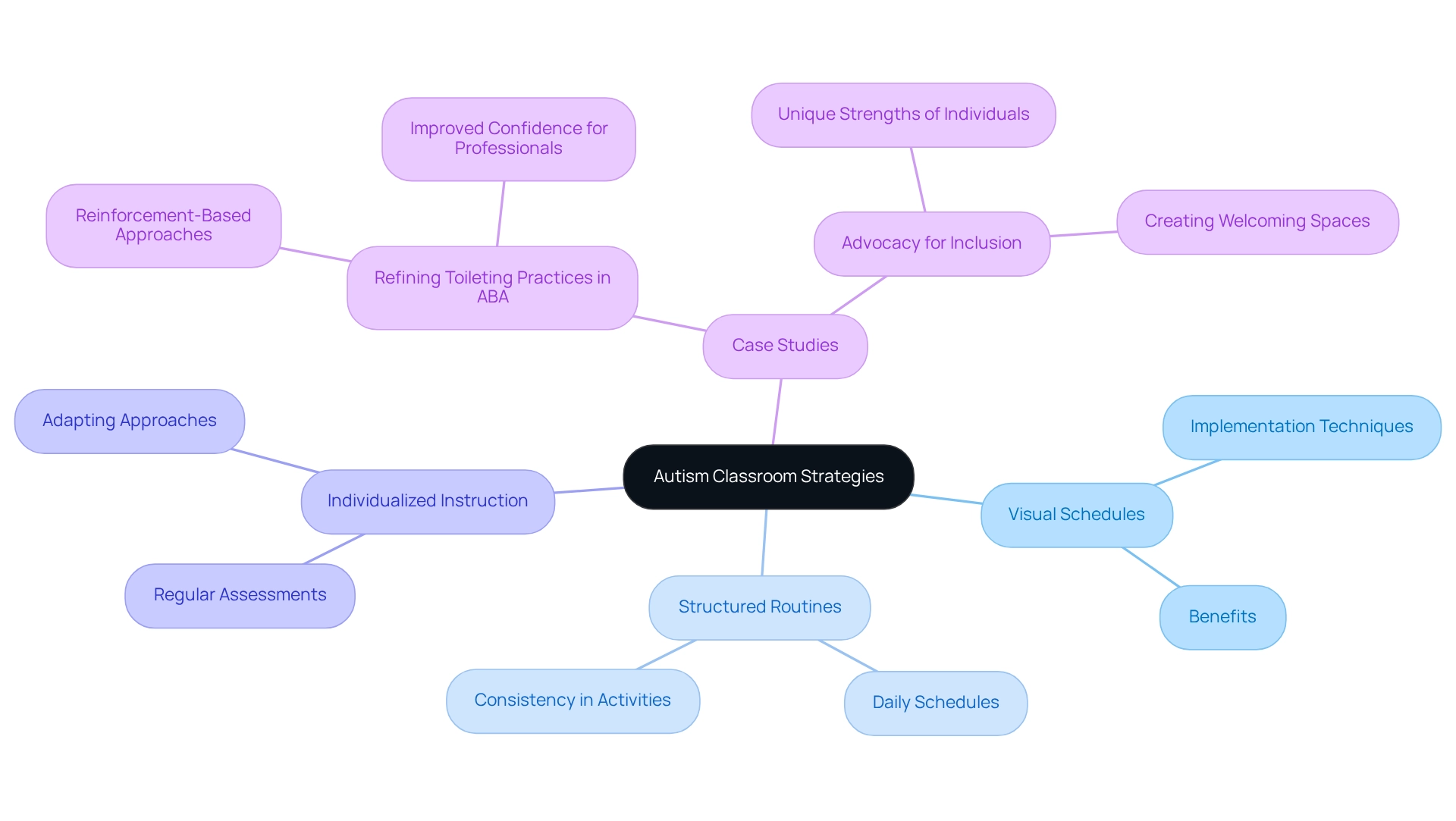
Hands in Autism: Specialized Training and Consultation Services
Hands in Autism offers customized training and consultation services designed to empower parents and professionals with essential skills for supporting individuals with developmental disorders. Their programs focus on evidence-based practices, providing caregivers with practical strategies that can be seamlessly integrated into various environments. This approach not only boosts the confidence and competence of caregivers but also aligns with the growing emphasis on tailored, evidence-based methodologies in autism support.
A poignant case study titled 'The Importance of Celebrating Small Victories' illustrates how recognizing and celebrating minor milestones in the lives of autistic individuals can profoundly impact the overall parenting experience. The findings reveal that acknowledging these small victories fosters a positive outlook and reinforces belief in the potential of autistic individuals. Honoring the uniqueness of children with developmental differences enriches family life, highlighting the importance of each young person's individual journey.
Moreover, research indicates that specialized training programs, like those offered by Hands in Autism, effectively enhance caregiver skills and outcomes for youth with developmental disorders. For example, studies show that caregivers who participate in specialized training experience a 30% increase in their confidence levels when applying strategies at home. By focusing on practical applications and contemporary evidence-based methods, Hands in Autism is at the forefront of preparing caregivers to navigate the complexities of autism assistance with confidence and resilience.
As O. Ivar Lovaas famously stated, "If they can't learn the way we teach, we teach the way they learn." This quote underscores the necessity of adapting teaching methods to meet the unique needs of each student. To further support your journey, consider enrolling in one of Hands in Autism's autism classes to gain valuable insights and strategies that can truly make a difference in your loved one's life.
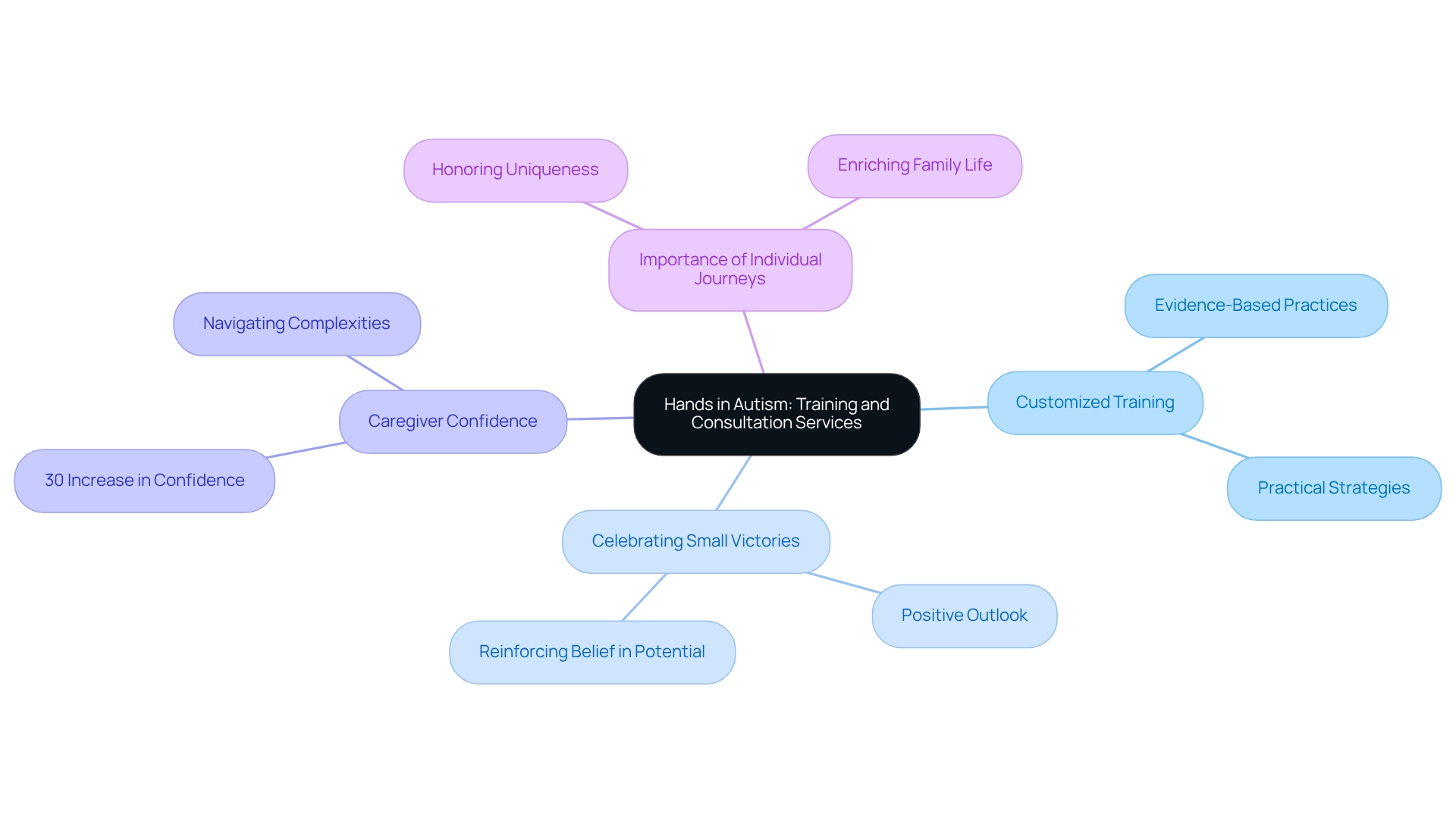
Class ABA: Insights into Autism Treatment and Support
Class ABA is dedicated to illuminating the principles of Applied Behavior Analysis (ABA), a vital therapy for developmental disorders. This approach emphasizes data-driven techniques that focus on specific behaviors and skills, resulting in measurable improvements. Research indicates that ABA-based interventions significantly enhance socialization, communication, and expressive language outcomes for individuals with ASD. A meta-analysis of 14 randomized control trials involving 555 participants underscores these impactful results.
When parents possess a solid understanding of ABA principles, they are better equipped to support their children's development. This knowledge nurtures effective collaboration with therapists and educators, ensuring a unified approach to treatment. The growing demand for autism classes reflects an increasing awareness among parents regarding the importance of structured, intensive therapy—recommended at a minimum of 25 hours per week—to achieve the best outcomes. Multiple case studies highlight that increased intensity and extended duration of therapy in autism classes correlate with notable improvements in communication, learning, and social behavior.
The challenges in accessing therapy services for individuals on the spectrum reveal the necessity for robust support systems. As our understanding of autism spectrum conditions deepens, the call for advocacy and reform in insurance coverage becomes crucial to guarantee that all individuals with this condition receive the essential support needed to thrive. By embracing ABA principles, parents can play a pivotal role in their children's development, unlocking their potential while fostering a culture of understanding and support for individuals on the spectrum.
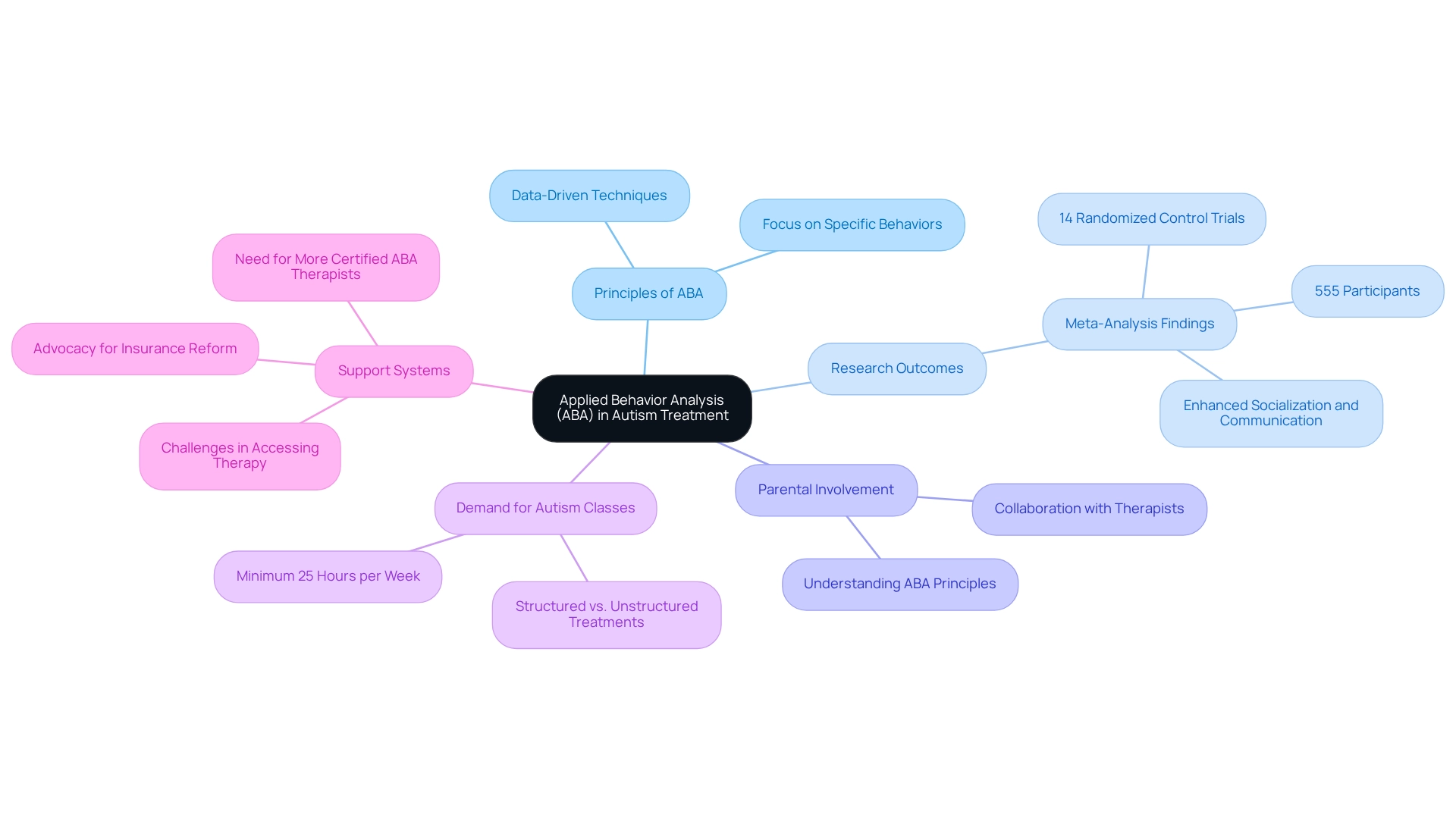
Free Recreational Events: Building Community for Families
Free leisure activities arranged for households affected by developmental disorders play a crucial role in nurturing community ties. These gatherings foster a welcoming atmosphere where families can bond, share experiences, and engage in enjoyable activities together. Research indicates that focusing on leisure can significantly enhance the quality of life for adults with ASD, suggesting that these occasions benefit not only children but also their relatives. Participating in autism classes promotes social interaction and alleviates feelings of isolation, which are common among families navigating the challenges of autism.
A study on social participation reveals that while social activities often take center stage, recreational pursuits may offer even greater advantages for managing stress and enhancing overall satisfaction. As Lauren Bishop-Fitzpatrick from the University of Wisconsin-Madison observes, "Interventions that offer opportunities for participation in recreational activities, even if those activities do not provide explicit opportunities for socialization, may help adults with ASD manage stress and feel more satisfied with their QoL."
In 2025, numerous free recreational activities are available, allowing families to participate without financial strain. Notably, the average parental income for households with autistic individuals stands at $12.11 in $10,000 units, underscoring the financial challenges these families face and highlighting the need for accessible events. By fostering community through these gatherings, families can build supportive networks that empower both them and their children, ultimately enhancing their well-being and social skills development.
Families are encouraged to seek out local recreational events, such as autism classes, which can serve as invaluable resources for connection and assistance. These opportunities not only enrich lives but also cultivate a sense of belonging and support within the community.
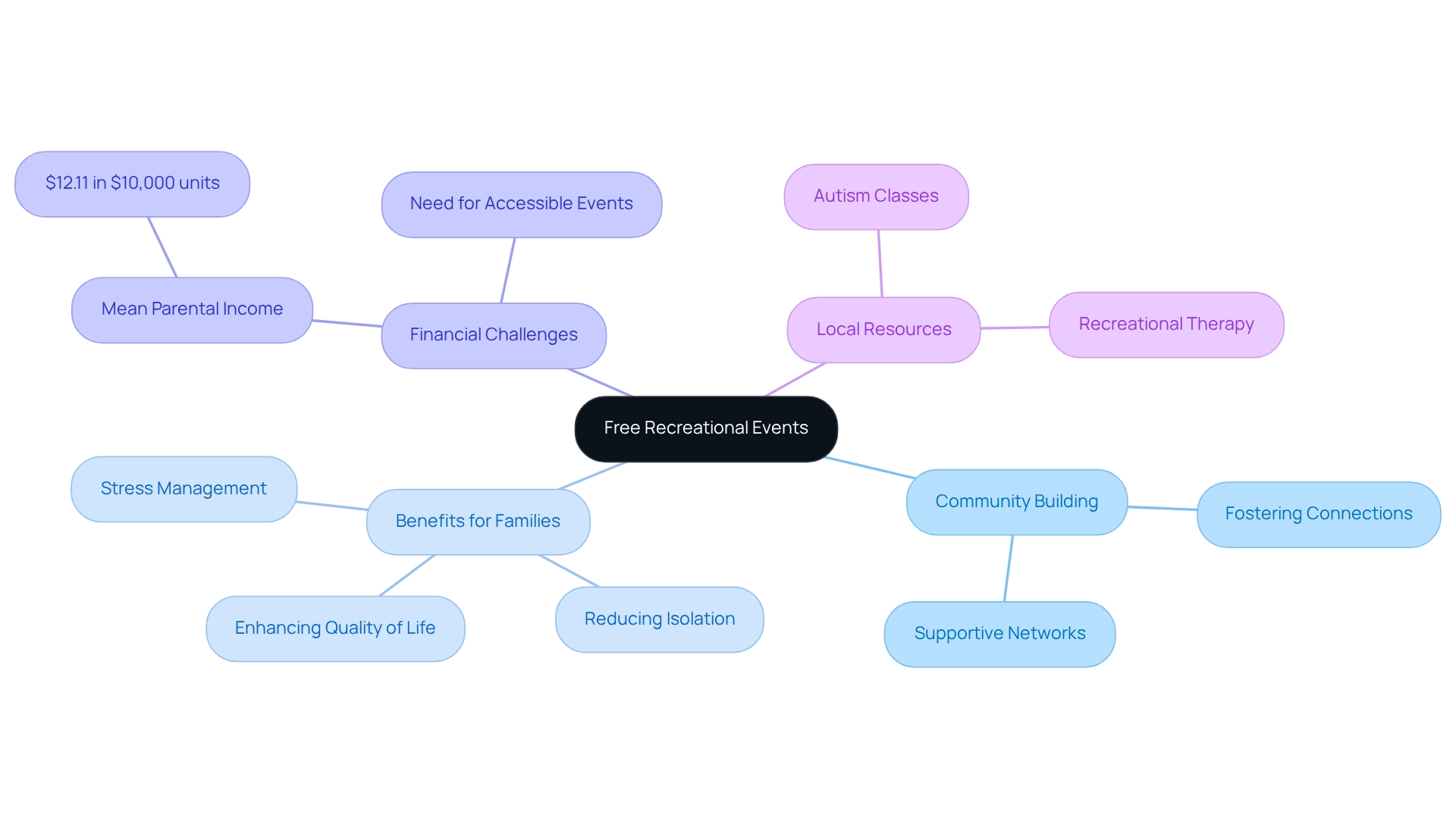
T-STEP Intervention: Support for Autistic Teens
The T-STEP (Transition to Employment and Postsecondary Education) intervention is a pivotal program designed to support autistic teens as they transition into adulthood. This initiative focuses on developing essential life skills, vocational training, and social competencies, equipping participants with the tools they need to navigate adult challenges. By fostering independence and self-advocacy, T-STEP empowers teens to take charge of their futures.
Recent statistics reveal that effective transition programs significantly enhance outcomes for autistic youth. This underscores the importance of organized assistance during this critical phase. Notably, there are no medications available that address the core symptoms of spectrum disorders (ASD), highlighting the vital role of interventions like T-STEP.
Expert insights further emphasize the necessity of life skills training. Advocates note that achieving milestones, regardless of their timing, signifies important victories in personal development. As Hyman SL from the Council on Children with Disabilities states, "One example of a pivotal skill is being able to initiate communication with others," which is a key focus of T-STEP. Additionally, Haley Moss acknowledges that while milestones may be reached at different times, they are still victories, reinforcing the message that progress in life skills is significant.
As of 2025, T-STEP continues to evolve, incorporating current trends in vocational training to better prepare autistic youth for the workforce and postsecondary education. For families seeking additional assistance and resources, organizations such as the American Academy of Pediatrics, Autism Society, and the National Institute on Child Health and Human Development are valuable points of contact.
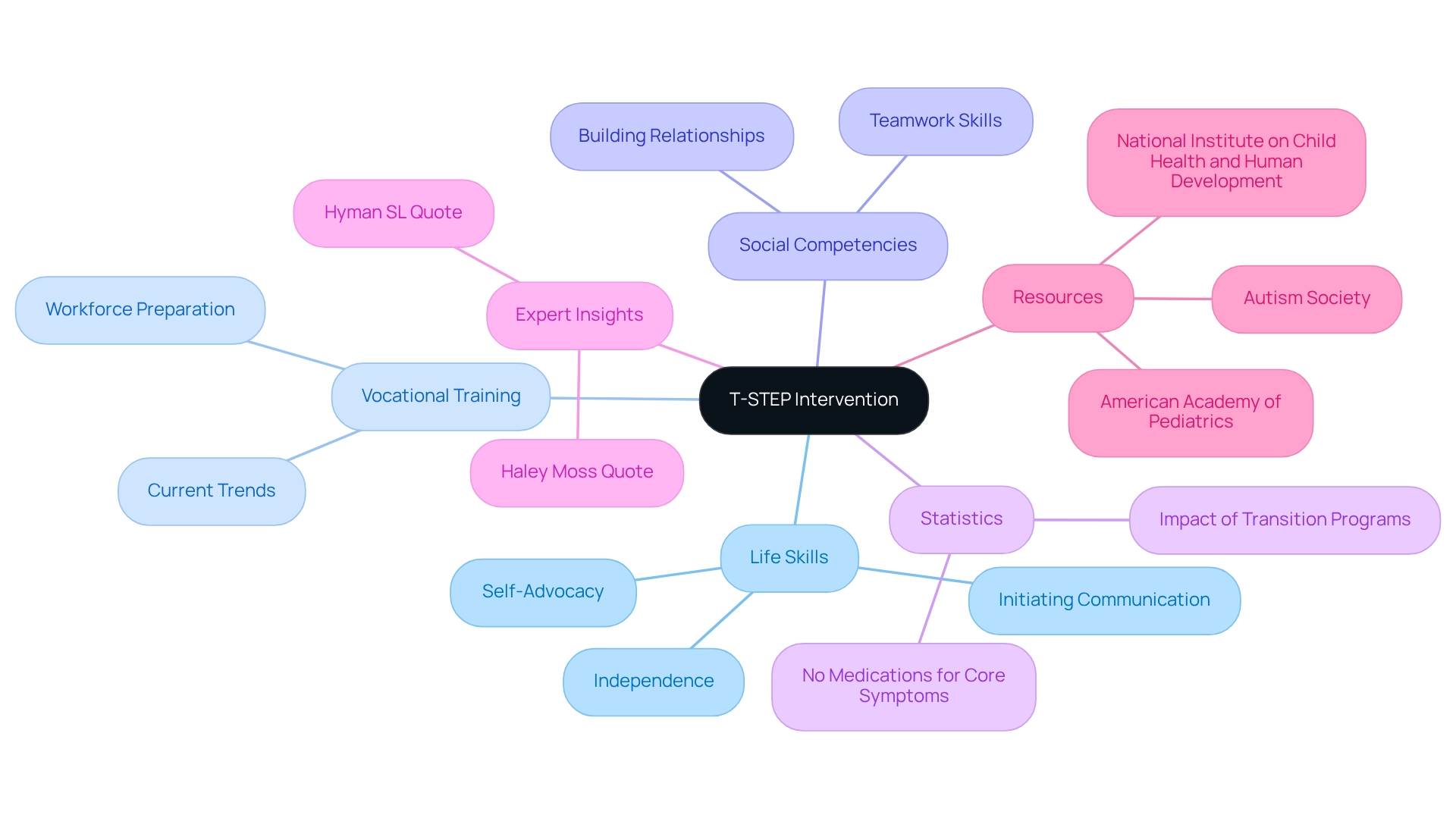
Work Together NC Resource Library: Tools for Autism Support
The Work Together NC resource library serves as a vital hub for families and professionals dedicated to supporting individuals with developmental disorders. This comprehensive library features a wide array of guides, toolkits, and best practices designed to enhance service assistance. By exploring these resources, caregivers can enrich their understanding of developmental disorders and implement effective strategies tailored to the unique needs of each individual.
Recent statistics reveal that the usage of the resource library has greatly improved caregiver effectiveness, empowering them to face challenges with newfound confidence. As O. Ivar Lovaas wisely stated, 'If they can't learn the way we instruct, we instruct the way they learn,' underscoring the importance of personalized approaches in supporting individuals with developmental differences.
Furthermore, the professional insights available within the library provide invaluable advice on the best methods for assisting individuals with developmental disorders, ensuring that families have access to the most current and effective resources. As we look toward 2025, the library continues to evolve, with updates highlighting the latest advancements in support for individuals with developmental disorders, including new toolkits and guides.
Additionally, an upcoming article titled 'Unraveling the seed oil and autism controversy,' set to be released on March 12, 2025, emphasizes the importance of staying informed about ongoing debates and research within the neurodiversity community. This makes the Work Together NC resource library an essential asset for those navigating this journey, fostering a sense of community and support among parents. We invite you to explore these resources and share your experiences, as together we can make a meaningful difference.
Understanding Autism Stages: Tailored Support for Improved Outcomes
Understanding the various phases of developmental disorders is crucial for offering personalized support that meets an individual's developmental needs. Each phase brings unique challenges and opportunities for growth, making it vital for both parents and professionals to recognize these stages. Autism is an integral aspect of a child's identity, not something that can be detached from who they are, which is essential for providing effective support. By implementing strategies that align with these developmental stages, we can significantly improve positive outcomes for individuals.
For instance, research indicates that diverse thinking styles can lead to a remarkable 48% increase in innovation within collaborative teams. This underscores the importance of embracing different perspectives when supporting individuals with developmental disorders. Such diversity is particularly critical in crafting tailored approaches that resonate with the distinct needs of autistic individuals. Furthermore, fostering self-acceptance plays a key role in the well-being of those on the spectrum, as it encourages them to celebrate their uniqueness.
As illustrated in the case study 'Promoting Understanding and Acceptance,' quotes advocating for understanding and acceptance highlight the necessity for societal change. We must work towards creating an inclusive environment where the potential of autistic individuals is acknowledged and valued. By concentrating on personalized support strategies—such as actively listening to the individual's needs and adjusting our approaches accordingly—parents and professionals can effectively navigate the complexities of autism. This ensures that the assistance provided evolves alongside the individual's growth, fostering a nurturing and supportive atmosphere.
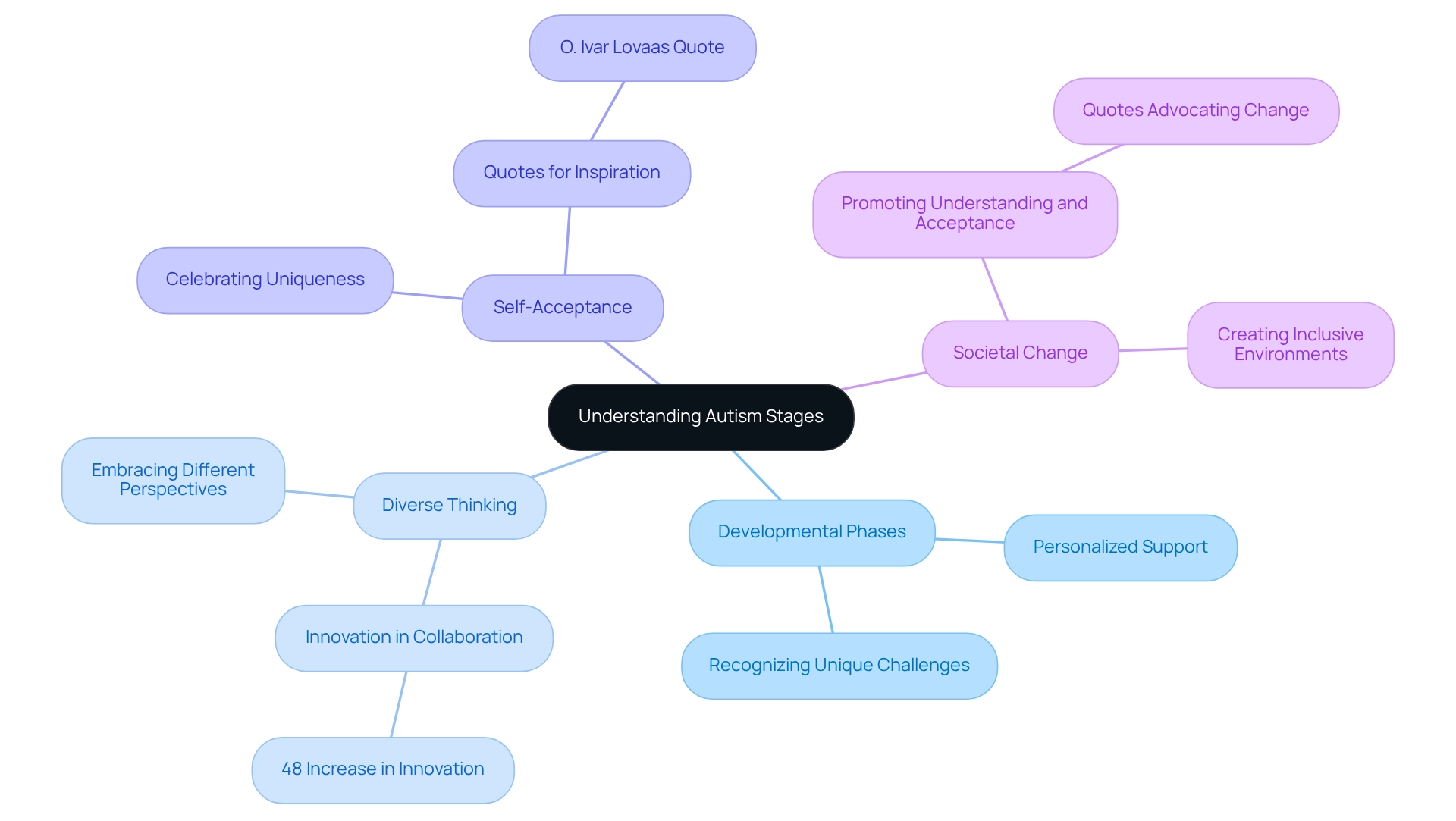
Conclusion
The intricate landscape of autism support highlights the pressing need for comprehensive resources and personalized interventions that empower both families and professionals. Organizations like ASD Media, Pathfinders for Autism, and Hands in Autism play a pivotal role by providing essential training and fostering community engagement. This ensures that parents and caregivers are well-equipped with the necessary tools to navigate the complexities of autism with confidence. The emphasis on structured learning approaches, such as TEACCH training, underscores the importance of creating supportive environments tailored to the unique needs of individuals on the spectrum.
Moreover, initiatives like the T-STEP intervention and the Work Together NC resource library illustrate the vital role of preparing autistic individuals for adulthood through vocational training and personalized resources. These efforts not only enhance the skills and confidence of caregivers but also cultivate a sense of community, which is crucial for emotional support and shared learning.
As our understanding of autism evolves, so too must the strategies we employ to support those affected. By prioritizing tailored approaches that acknowledge the diverse needs and stages of individuals with autism, we can foster a more inclusive society. This ongoing commitment to awareness, acceptance, and advocacy is essential for creating an environment where every individual can thrive and realize their full potential.
Frequently Asked Questions
What is the mission of ASD Media?
ASD Media is committed to enhancing the execution of ABA therapy by providing resources and support tailored for both parents and professionals, empowering families with knowledge to navigate developmental disorders and ADHD.
What are the statistics regarding resource utilization for individuals with developmental disorders?
Resource utilization varies significantly, with statistics showing 24.7% in New Jersey and 93.5% in Puerto Rico, indicating a need for accessible support across different regions.
How does ASD Media foster a collaborative community?
ASD Media encourages individuals to share their experiences and learn from one another, promoting initiatives that cultivate appreciation for neurodiversity and discussions that improve outcomes for individuals with developmental differences.
What types of resources does ASD Media provide for parents?
ASD Media offers professional insights on ABA therapy, the latest trends in autism classes, and case studies that highlight the positive impact of community involvement on therapy outcomes.
What is TEACCH training, and how does it benefit parents and educators?
TEACCH training provides a nurturing approach to learning for individuals in autism classes, emphasizing visual supports and organized environments to foster communication and learning. It equips parents and educators with practical skills to create supportive learning spaces.
What impact have workshops from Pathfinders for Autism had on parent engagement?
Participation in workshops has led to a 75% improvement in parents' engagement with their children, demonstrating the effectiveness of the communication techniques and behavior management strategies taught.
What is the significance of the Pickle with Purpose Tournament?
The Pickle with Purpose Tournament, scheduled for May 19, is an opportunity for community involvement and support for initiatives related to developmental disorders.
Who has praised the initiatives of Pathfinders for Autism?
William P. White from Johns Hopkins University emphasized the importance of Pathfinders for Autism's programs in developing positive community relationships, while Sgt. Michael Cox commended the training for law enforcement as a significant initiative.




